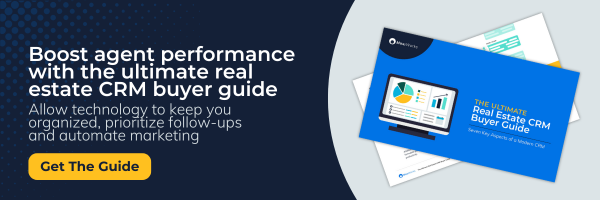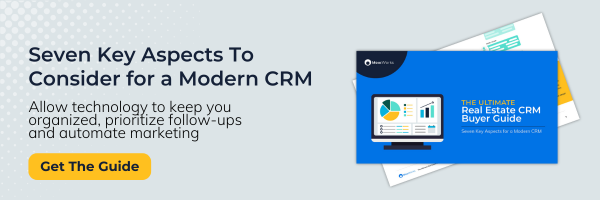Adding contacts is only the first step in realizing the true power of your CRM to help you build your sphere of influence (SOI), the circle of people who know, like, and trust you. Your CRM can do so, so much more than just store contact information — and with a little investment upfront, it can truly be your perfect sidekick. If you’re wondering how to turn way more leads into listings won, read on. These practical real estate tips for your CRM will pave the way to more transactions and building your SOI at scale.
1. Segment Your Leads for Targeted Follow-Ups
Your CRM helps you categorize leads based on their stage in the buying or selling process, but it’s only as good as the information you give it. Take the time to add tags or notes to each contact, right as they come into your database, so it can help you set the right tone from the word “go”. Are they browsing, comparing, or ready to make a move? Create specific categories, such as “new buyer,”, “upsizer”,“potential seller,” or “investor.” This allows you to send valuable content to the right person at the right time.
Bonus Tip: More and more of the best CRMs and nurture tools offer AI solutions to intelligently categorize leads for you. This improves your data quality and saves you time — a win-win! Learn more about how to unlock the opportunities in your database with ActivePipe.
2. Automate Your Follow-Up
It’s all too easy to fall into the trap of forgetting to follow up, especially when juggling multiple clients. Randomly engaging with your SOI when you have free time is not just unsustainable — it holds you back from your growth potential. According to a study by Annuitas Group, businesses that use marketing automation to nurture prospects experience a 451% increase in qualified leads. Automating your marketing is probably the most important real estate tip in this list because it lets you capture the true value of your SOI, and (perhaps even more importantly) it will help you avoid getting burnt out.
With a strong CRM, you can set up automated drip campaigns that nurture leads over time, so everyone in your database feels like they are in touch with you, whether your schedule is light or completely packed. Here are a few you’ll definitely want to have running:
- Try creating a sequence of emails for potential sellers, providing insights on market trends, neighborhood comps, or success stories of recently sold homes.
- Set up a quick series of emails and texts for new leads you weren’t able to get on the phone with right away, introducing yourself and inviting them to book a consultation or tour a home together.
- Show up for past clients with carefully-timed reminders of home maintenance tasks and an annual property review, helping them take care of their home and understand their investment in relation to the current market.
Whether it’s a new listing, a friendly reminder, or a quick ping to a brand new lead, taking the time to think through key automation triggers will ensure you don’t miss your golden opportunity to show up with valuable information right when each contact is looking for it.

3. Track Every Interaction and Follow-Up
Every email, phone call, and meeting with your leads should be logged into your CRM. It’s easy to forget conversations and commitments when you’re managing multiple prospects, but your CRM remembers it all. Use it to track your interactions, so when you follow up, you can reference your last discussion or remind them of what was agreed upon. Personal touches build trust and demonstrate you’re serious about helping them achieve their real estate goals.
Real Estate Tips in Action: If you spoke to a potential seller who wasn’t ready to list six months ago, you can set a reminder in your CRM to check in on their situation now that market conditions may have changed. You may have remembered to follow up on your own, but when it’s in your CRM, you know you’ll remember.
4. Use Lead Prioritzation to Focus Your Efforts
Lead priortization is a powerful tool that helps you focus your energy on the most promising leads. For example, a contact who opened three of your emails and clicked on a property link should be ranked higher priority (and thus get more of your active attention) than someone who never opened those same emails. Your CRM should allow you to prioritize leads based on their engagement level: some will do this for you automatically based on a rule-based system you create, or in a predictive way based on an algorithm.
It makes intuitive sense that focusing your attention on leads that are more likely to convert will improve your chances of closing deals. In fact, research shows that businesses using predictive lead prioritization systems can experience up to 77% greater lead generation ROI versus companies that do not use lead scoring. (DemandGen Report).
5. Personalize Your Outreach
Let’s face it, people can spot a generic email from a mile away. A dull, impersonal message can easily put frost on a budding relationship. Your CRM allows you to build segmentation that will ensure your automated communications stay relevant, but you should also keep detailed notes about your leads, from their favorite sports team to their kid’s name, to make 1:1 outreach authentic and impactful.
Real Estate Tips in Action: Instead of sending out a mass “New Listings” email to your Upsizers, personalize it with “Hi [Lead Name], I just found this listing that I think would give you that extra space we discussed last time we connected. Let me know if you want to see it!”
6. Keep Your Database Clean and Updated
There’s a common saying: put garbage in, get garbage out. While people who use this phrase are usually talking about nutrition, it also applies to your CRM. Statistics show that across industries, CRM data decays by about 34% annually (Validity.com), meaning up to a third of the contacts you communicated with a year ago could now be invalid.
Keep your lead database clean by regularly scheduling time to review and update your contacts. Remove duplicates, update phone numbers, and recategorize leads that may have slipped into the wrong bucket. Also, don’t be afraid to remove dead leads. A clean CRM not only saves you time but makes your outreach more efficient by ensuring you’re only reaching out to your true SOI.

7. Use Reporting Tools to Optimize Your Strategy
Your CRM isn’t just a contact list—it’s a goldmine of data. Dive into the analytics to see what’s working and what’s not. Which email campaigns are driving the most engagement? Which types of leads and sources are converting at the highest rates? Your CRM’s reporting tools can help you fine-tune your strategy and double down on the efforts that are yielding the best results.
Real Estate Tips in Action: Dedicate time each month to review your CRM’s performance data. Adjust your strategies based on what’s resonating with your leads, and ditch any outreach that’s falling flat.
The Right CRM Helps You Work Smarter, Not Harder
These real estate tips for your CRM will help you stay organized and engage your sphere in a systematic way that wins you more listings and helps build loyal relationships. Remember, your CRM isn’t just a tool—it’s your ticket to staying on top of your game in a competitive market. For instance, agents who use MoxiEngage, our CRM solution for productive agents, see 93% higher sales volume than those without. Can you afford not to use a CRM to the fullest?
Put these tips into action with your CRM today, and start seeing the results you deserve!



